下記資料に掲げた
2014年4月21日付ロシア・トゥデイ(RT)に
「Fukushima radiation killing our children, govt hides truth - former mayor」
というタイトルの下、
双葉町の元町長・井戸川克隆氏の訴えが
掲載されています。
サイト「マスコミに載らない海外記事」の管理人さんが
「真実を隠す日本政府:福島の放射能で子供や東電社員達が亡くなっている」
と題して
ロシア・トゥデイの記事を訳出して下さってますので、
お読みになればいいと思います。
☆ 記事URL:http://eigokiji.cocolog-nifty.com/blog/2014/04/post-feee.html
ここでは、
井戸川氏の証言を書き出しておきます。
どれもこれも日本のメディアが
取り上げないものです。
読んで改めて、
そうなのかと活を入れられました。
僕は、
この記事を
hiroshi@t464さんのツイート〔6:46 - 2014年4月23日 〕で知りました。
貴重な情報の拡散に
感謝します。
さて、証言は、
記事の叙述に従っておりますので、
疑問点が
あれば元記事をご参照ください。
前後を読めば、
疑問が解消するのではないでしょうか。
それでも、
不明な箇所があれば、
自分の胸に
しまって置いてください。
訊かれましても、
僕にも
きっと分からないでしょうから(笑)。
いや、これは、
冗談です。
尋ねられたら
理解できる範囲で、
全力で
お答えしますので
よろしく。
証言(1)
チェルノブイリと比較すると福島周辺の放射能レベルは“4倍高いのです”と彼はRTのソフィー・シュワルナゼに語り“住民が福島県に戻るのはまだ早すぎます”と語った。
“政府が何を言おうと、決して安全ではありません。”
(元町長は、大気の汚染はわずかながら減少しているが、土壌汚染は変わっていないことを示す福島県地図を示した。下記資料中の元町長が写り込んでいる画像参照。)
証言(2)
(県内には約200万人が住んでおり、“あらゆる種類の医療問題”を抱えているというが、政府は、こうした状態は福島原発事故とは無関係だと言い張っている。)
“当局にその主張を書面で実証するよう要求しましたが、私の要求を無視しました。”
証言(3)
“現実には、放射能がまだ存在しているのに、人々は政府の言い分を信じているのです。これで子供達が亡くなっています。子供達は心臓病、喘息、白血病、甲状腺炎…で亡くなっています。多くの子供達は、授業の後、ひどくつかれています。体育の授業に出られない生徒たちもいます。ところが、当局は依然、真実を我々から隠しているのです。一体なぜかはわかりません。彼等におこさんはいないのでしょうか? 彼等が、我々の子供達を守ることができないことがわかるというのは、つらいことです。”
証言(4)
“彼等は福島県は安全だと言い、それで誰も子供を、どこかへ避難させようとしていないのです。我々はこのことを議論することさえ許されていません。”
証言(5)
“彼ら(除染等で働く労働者達)の器具は劣化しつつあります。準備は悪化しつつあります。そこで、彼等は自分達の安全を第一に考え始めざるを得なくなったのです。それが、放射能の本当の危険を理解している人々が退職し始めた理由です。今では、素人達が現場で働いています。彼等は自分たちがしていることが何か実際に理解していません。こうした人々が間違ったポンプを使ったり、そうした類の間違いをしたりするのです。
証言(6)
労働者や一般住民の中には放射能に関連する死者や急性疾患はいないという国連報告の詳細について問うと、井戸川は、危機の頂点で味わった自分自身の体験の一部を語る前に、“全くの嘘です”と切り捨てた。
“町長時代、心臓麻痺で亡くなった多くの方を存じていますし、以後も福島で、若い方々にさえ、突然亡くなった方々が多数おられます。当局が、全世界や国連に対し、真実を隠しているのは実に恥ずかしいことです。実際に多くの方々が亡くなっている事実を認めることが必要です。こういうことをいうのは禁じられていますが、東京電力社員も亡くなっています。けれども彼等はそれについては黙して語りません。”
証言(7)
1億2600万人の国民向けのエネルギー源として、日本には他にどのような選択肢があるか尋ねると、多数の川があるのに、政府は水力発電を無視していると彼は答えた。
理由は何か? “大企業が儲からない!”為だ。
“投資資金が限られていても、増税せずに多数の人々に電力を送れます。重力を利用するだけで非常に多くのエネルギーが得られますから、もはや原子力発電所は不要です。”
証言(8)
“私が何も知らないふりをして、原子力発電所で起きる可能性がある事故について質問すると、私の様々な疑問に彼等が答えられないことがわかりました”と彼は語った。“率直に申しあげて、その時、東電幹部に、緊急時対策がないことに始めて気がついたのです。その時に、原発が危険なことになりうると私は悟ったのです。”
証言(9)
“より大きな津波が来る前に何とか戻ることが出来ました。後になって始めて、津波から生きのびられたことを知りました… 幸運でした。私がその道を運転して過ぎた後、津波が来て、山にまで至ったのです。”
30分の帰路、運転しながら、原子力発電所についての疑問ばかり考えていた。“‘地震がこれほど激しいなら、原発で一体何が起きるだろう? もし原子炉が損傷したらどうなるだろう? 水が漏れたらどうなるだろう? 町は何をするだろう? 町長として、何をすべきだろう?とずっと考え続けていました’”
町長室に到着した井戸川は窓外を眺め、彼が“恐ろしい光景”と表現するものに直面した。
“普通ここからは海は見えませんが、あの時は300-500m先まで見えました”と彼は言う。
町長が原子力発電所は恐らく何らかの損傷を受けただろうと気がついたのはその時だった。夜は、携帯電話さえ機能していなかったので、唯一の情報源、テレビのニュース報道を見て過ごした後、井戸川は翌朝早く緊急避難を発令した。
“後になって、双葉住民全員が私の声明を聞けたわけではなかったことを知りました。申し訳なく思っています…福島県が、時宜にかなう形で、私に全ての情報を教えていなかったことに気がつきました。現在、政府は放射能から住民の安全を確保するいかなる措置も講じていませんし、避難手順の実施も監視していません。”
証言(10)
“日本には様々な法律があります。おそらく多すぎるのです。河川やその利用方法に関する法律があります。農業用水利用に関する法律を変えれば、川を発電用に使用することが始められます。この法律を変えるだけでも、膨大なエネルギーが得られるでしょう。”
〔資料〕
「Fukushima radiation killing our children, govt hides truth - former mayor」
RT(Published time: April 21, 2014 14:03 )
☆ 記事URL:http://rt.com/news/tokyo-radiation-fukushima-children-836/
Katsutaka Idogawa, former mayor of Futaba, a town near the disabled Fukushima nuclear plant, is warning his country that radiation contamination is affecting Japan’s greatest treasure – its children.
Asked about government plans to relocate the people of Fatuba to the city of Iwaki, inside the Fukushima prefecture, Idogawa criticized the move as a “violation of human rights.”
Compared with Chernobyl, radiation levels around Fukushima “are four times higher,” he told RT’s Sophie Shevardnadze, adding that “it’s too early for people to come back to Fukushima prefecture.”
“It is by no means safe, no matter what the government says.”
Idogawa alleges that the government has started programs to return people to their towns despite the danger of radiation.
“Fukushima Prefecture has launched the Come Home campaign. In many cases, evacuees are forced to return. [the former mayor produced a map of Fukushima Prefecture that showed that air contamination decreased a little, but soil contamination remains the same.]"

According to Idogawa there are about two million people residing in the prefecture who are reporting “all sorts of medical issues,” but the government insists these conditions are unrelated to the Fukushima accident. Idogawa wants their denial in writing.
“I demanded that the authorities substantiate their claim in writing but they ignored my request.”
Once again, Idogawa alludes to the nuclear tragedy that hit Ukraine on April 26, 1986, pleading that the Japanese people “never forget Chernobyl.” Yet few people seem to be heeding the former government official’s warning.
“They believe what the government says, while in reality radiation is still there. This is killing children. They die of heart conditions, asthma, leukemia, thyroiditis… Lots of kids are extremely exhausted after school; others are simply unable to attend PE classes. But the authorities still hide the truth from us, and I don’t know why. Don’t they have children of their own? It hurts so much to know they can’t protect our children.
“They say Fukushima Prefecture is safe, and that’s why nobody’s working to evacuate children, move them elsewhere. We’re not even allowed to discuss this.”
The former mayor found it ironic that when discussing the Tokyo Olympics, scheduled for 2020, Prime Minister Abe frequently mentions the Japanese word, “omotenashi,” which literally means that you should “treat people with an open heart.”
In Idogawa’s opinion, the same treatment does not apply equally to the people most intimately connected with Fukushima: the workers involved in the cleanup operations.
“Their equipment was getting worse; preparation was getting worse. So people had to think about their safety first. That’s why those who understood the real danger of radiation began to quit. Now we have unprofessional people working there.

They don’t really understand what they’re doing. That’s the kind of people who use the wrong pump, who make mistakes like that.
“I’m really ashamed for my country, but I have to speak the truth for the sake of keeping our planet clean in the future.
Idogawa then made some parallels with one of the most tragic events in the history of Japan: the use of atomic bombs on the industrial cities of Hiroshima and Nagasaki by the United States at the end of World War II.
“The authorities lied to everyone (about the effects of the atomic bombings)...They hid the truth. That’s the situation we are living in. It’s not just Fukushima. Japan has some dark history. This is a sort of a sacrifice to the past.”
When pressed on the details of a United Nations report that says there have been no radiation-related deaths or acute diseases observed among the workers and general public, Idogawa dismisses it as “completely false,” before providing some of his own experiences at the height of the crisis.
“When I was mayor, I knew many people who died from heart attacks, and then there were many people in Fukushima who died suddenly, even among young people. It’s a real shame that the authorities hide the truth from the whole world, from the UN. We need to admit that actually many people are dying. We are not allowed to say that but TEPCO employees also are dying. But they keep mum about it.”
When asked to provide solid figures on the actual number of people who died under such circumstances, Idogawa refrained, saying “it’s not just one or two people. We’re talking about ten to twenty people who died this way.”
Asked about other options that Japan has for providing energy sources to its 126 million people, he responded that despite having many rivers, the government neglects to promote hydro energy.
Why? Because it’s not “profitable for big companies!”
Idogawa goes on to provide a blueprint for fulfilling Japan’s energy needs that sounds surprisingly simple.
“We can provide electricity for a large number of people even with limited investment, without taxes. Just use gravity, and we may have so much energy that there’ll be no need for nuclear plants anymore.”
Premonitions of disaster
Even before the massive failure at the Fukushima nuclear power plant on March 11, 2011, the day northeastern Japan was hit by an earthquake-triggered tsunami that caused the meltdown of three of the plant's six nuclear reactors, Idogawa knew the facility was dangerous.
“I asked them about potential accidents at a nuclear power plant, pretending I didn’t know anything about it, and it turned out they were unable to answer many of my questions,” he said. “Frankly, that’s when it first crossed my mind that their management didn’t have a contingency plan. It was then that I realized the facility could be dangerous.”
The former mayor, who happened to be in a nearby town on the day the tsunami struck, recalled driving back to Futaba upon news of the earthquake. Only later did he discover how close he came to losing his life in the approaching tsunami.
“I managed to get there before the bigger tsunami came. It was only later that I realized that I escaped the water... I got lucky. The tsunami came after I drove off that road and up the mountains.”

Questions regarding the nuclear power plant dominated his thoughts on the 30-minute drive home. “I just kept thinking, ‘If it’s that strong, what will happen to the power plant? What if the reactor is damaged? What if the water leaks? What will the city do? What am I to do as mayor?’"
Once in his office, Idogawa looked out the window and was confronted by what he described as “a terrifying sight.”
“Usually you couldn’t see the sea from there, but that time I could see it just 300-500m away,” he said.
It was at that point that the mayor realized that the nuclear power plant had probably suffered some sort of damage. After spending the night watching news reports on television, the only source of information since even mobile phones were not working, Idogawa announced an emergency evacuation early the next morning. Not all of the residents, however, heard the emergency broadcast.
“Later, I learned that not all Futaba residents heard my announcement. I feel guilty about that…I found out that the Fukushima prefecture hadn’t given me all the information in a timely fashion. And now the government isn’t taking any steps to ensure people’s safety from radiation, and isn’t monitoring the implementation of evacuation procedures.”
Beyond nuclear energy
Katsutaka Idogawa believes a transformation to a cleaner, safer form of energy source for Japan would require a willingness to change the country’s laws.
“There are many laws in Japan, perhaps too many. There are laws about rivers and the ways they’re used. We could change laws regarding agricultural water use and start using rivers to produce electricity. Changing just this law alone will allow us to produce a lot of energy.”
All of this could be accomplished “without contaminating our planet.”
However, such bold proposals do not “appeal to big companies, because you don’t need big investments, you don’t need to build big power plants. It’s not that profitable for investors, for capitalists.”
But for the former mayor of a devastated Japanese town, lost to nuclear radiation, Idogawa senses a sea change forming in public opinion.
The Japanese people are beginning to “realize that we need to avert nuclear disasters, so 60-70 percent of the population is in favor of using natural energy.”
“It took us a long time, but one day we’ll follow the example of Europe, of Germany.”
2014年4月21日付ロシア・トゥデイ(RT)に
「Fukushima radiation killing our children, govt hides truth - former mayor」
というタイトルの下、
双葉町の元町長・井戸川克隆氏の訴えが
掲載されています。
サイト「マスコミに載らない海外記事」の管理人さんが
「真実を隠す日本政府:福島の放射能で子供や東電社員達が亡くなっている」
と題して
ロシア・トゥデイの記事を訳出して下さってますので、
お読みになればいいと思います。
☆ 記事URL:http://eigokiji.cocolog-nifty.com/blog/2014/04/post-feee.html
ここでは、
井戸川氏の証言を書き出しておきます。
どれもこれも日本のメディアが
取り上げないものです。
読んで改めて、
そうなのかと活を入れられました。
僕は、
この記事を
hiroshi@t464さんのツイート〔6:46 - 2014年4月23日 〕で知りました。
貴重な情報の拡散に
感謝します。
さて、証言は、
記事の叙述に従っておりますので、
疑問点が
あれば元記事をご参照ください。
前後を読めば、
疑問が解消するのではないでしょうか。
それでも、
不明な箇所があれば、
自分の胸に
しまって置いてください。
訊かれましても、
僕にも
きっと分からないでしょうから(笑)。
いや、これは、
冗談です。
尋ねられたら
理解できる範囲で、
全力で
お答えしますので
よろしく。
証言(1)
チェルノブイリと比較すると福島周辺の放射能レベルは“4倍高いのです”と彼はRTのソフィー・シュワルナゼに語り“住民が福島県に戻るのはまだ早すぎます”と語った。
“政府が何を言おうと、決して安全ではありません。”
(元町長は、大気の汚染はわずかながら減少しているが、土壌汚染は変わっていないことを示す福島県地図を示した。下記資料中の元町長が写り込んでいる画像参照。)
証言(2)
(県内には約200万人が住んでおり、“あらゆる種類の医療問題”を抱えているというが、政府は、こうした状態は福島原発事故とは無関係だと言い張っている。)
“当局にその主張を書面で実証するよう要求しましたが、私の要求を無視しました。”
証言(3)
“現実には、放射能がまだ存在しているのに、人々は政府の言い分を信じているのです。これで子供達が亡くなっています。子供達は心臓病、喘息、白血病、甲状腺炎…で亡くなっています。多くの子供達は、授業の後、ひどくつかれています。体育の授業に出られない生徒たちもいます。ところが、当局は依然、真実を我々から隠しているのです。一体なぜかはわかりません。彼等におこさんはいないのでしょうか? 彼等が、我々の子供達を守ることができないことがわかるというのは、つらいことです。”
証言(4)
“彼等は福島県は安全だと言い、それで誰も子供を、どこかへ避難させようとしていないのです。我々はこのことを議論することさえ許されていません。”
証言(5)
“彼ら(除染等で働く労働者達)の器具は劣化しつつあります。準備は悪化しつつあります。そこで、彼等は自分達の安全を第一に考え始めざるを得なくなったのです。それが、放射能の本当の危険を理解している人々が退職し始めた理由です。今では、素人達が現場で働いています。彼等は自分たちがしていることが何か実際に理解していません。こうした人々が間違ったポンプを使ったり、そうした類の間違いをしたりするのです。
証言(6)
労働者や一般住民の中には放射能に関連する死者や急性疾患はいないという国連報告の詳細について問うと、井戸川は、危機の頂点で味わった自分自身の体験の一部を語る前に、“全くの嘘です”と切り捨てた。
“町長時代、心臓麻痺で亡くなった多くの方を存じていますし、以後も福島で、若い方々にさえ、突然亡くなった方々が多数おられます。当局が、全世界や国連に対し、真実を隠しているのは実に恥ずかしいことです。実際に多くの方々が亡くなっている事実を認めることが必要です。こういうことをいうのは禁じられていますが、東京電力社員も亡くなっています。けれども彼等はそれについては黙して語りません。”
証言(7)
1億2600万人の国民向けのエネルギー源として、日本には他にどのような選択肢があるか尋ねると、多数の川があるのに、政府は水力発電を無視していると彼は答えた。
理由は何か? “大企業が儲からない!”為だ。
“投資資金が限られていても、増税せずに多数の人々に電力を送れます。重力を利用するだけで非常に多くのエネルギーが得られますから、もはや原子力発電所は不要です。”
証言(8)
“私が何も知らないふりをして、原子力発電所で起きる可能性がある事故について質問すると、私の様々な疑問に彼等が答えられないことがわかりました”と彼は語った。“率直に申しあげて、その時、東電幹部に、緊急時対策がないことに始めて気がついたのです。その時に、原発が危険なことになりうると私は悟ったのです。”
証言(9)
“より大きな津波が来る前に何とか戻ることが出来ました。後になって始めて、津波から生きのびられたことを知りました… 幸運でした。私がその道を運転して過ぎた後、津波が来て、山にまで至ったのです。”
30分の帰路、運転しながら、原子力発電所についての疑問ばかり考えていた。“‘地震がこれほど激しいなら、原発で一体何が起きるだろう? もし原子炉が損傷したらどうなるだろう? 水が漏れたらどうなるだろう? 町は何をするだろう? 町長として、何をすべきだろう?とずっと考え続けていました’”
町長室に到着した井戸川は窓外を眺め、彼が“恐ろしい光景”と表現するものに直面した。
“普通ここからは海は見えませんが、あの時は300-500m先まで見えました”と彼は言う。
町長が原子力発電所は恐らく何らかの損傷を受けただろうと気がついたのはその時だった。夜は、携帯電話さえ機能していなかったので、唯一の情報源、テレビのニュース報道を見て過ごした後、井戸川は翌朝早く緊急避難を発令した。
“後になって、双葉住民全員が私の声明を聞けたわけではなかったことを知りました。申し訳なく思っています…福島県が、時宜にかなう形で、私に全ての情報を教えていなかったことに気がつきました。現在、政府は放射能から住民の安全を確保するいかなる措置も講じていませんし、避難手順の実施も監視していません。”
証言(10)
“日本には様々な法律があります。おそらく多すぎるのです。河川やその利用方法に関する法律があります。農業用水利用に関する法律を変えれば、川を発電用に使用することが始められます。この法律を変えるだけでも、膨大なエネルギーが得られるでしょう。”
〔資料〕
「Fukushima radiation killing our children, govt hides truth - former mayor」
RT(Published time: April 21, 2014 14:03 )
☆ 記事URL:http://rt.com/news/tokyo-radiation-fukushima-children-836/
Katsutaka Idogawa, former mayor of Futaba, a town near the disabled Fukushima nuclear plant, is warning his country that radiation contamination is affecting Japan’s greatest treasure – its children.
Asked about government plans to relocate the people of Fatuba to the city of Iwaki, inside the Fukushima prefecture, Idogawa criticized the move as a “violation of human rights.”
Compared with Chernobyl, radiation levels around Fukushima “are four times higher,” he told RT’s Sophie Shevardnadze, adding that “it’s too early for people to come back to Fukushima prefecture.”
“It is by no means safe, no matter what the government says.”
Idogawa alleges that the government has started programs to return people to their towns despite the danger of radiation.
“Fukushima Prefecture has launched the Come Home campaign. In many cases, evacuees are forced to return. [the former mayor produced a map of Fukushima Prefecture that showed that air contamination decreased a little, but soil contamination remains the same.]"

According to Idogawa there are about two million people residing in the prefecture who are reporting “all sorts of medical issues,” but the government insists these conditions are unrelated to the Fukushima accident. Idogawa wants their denial in writing.
“I demanded that the authorities substantiate their claim in writing but they ignored my request.”
Once again, Idogawa alludes to the nuclear tragedy that hit Ukraine on April 26, 1986, pleading that the Japanese people “never forget Chernobyl.” Yet few people seem to be heeding the former government official’s warning.
“They believe what the government says, while in reality radiation is still there. This is killing children. They die of heart conditions, asthma, leukemia, thyroiditis… Lots of kids are extremely exhausted after school; others are simply unable to attend PE classes. But the authorities still hide the truth from us, and I don’t know why. Don’t they have children of their own? It hurts so much to know they can’t protect our children.
“They say Fukushima Prefecture is safe, and that’s why nobody’s working to evacuate children, move them elsewhere. We’re not even allowed to discuss this.”
The former mayor found it ironic that when discussing the Tokyo Olympics, scheduled for 2020, Prime Minister Abe frequently mentions the Japanese word, “omotenashi,” which literally means that you should “treat people with an open heart.”
In Idogawa’s opinion, the same treatment does not apply equally to the people most intimately connected with Fukushima: the workers involved in the cleanup operations.
“Their equipment was getting worse; preparation was getting worse. So people had to think about their safety first. That’s why those who understood the real danger of radiation began to quit. Now we have unprofessional people working there.

They don’t really understand what they’re doing. That’s the kind of people who use the wrong pump, who make mistakes like that.
“I’m really ashamed for my country, but I have to speak the truth for the sake of keeping our planet clean in the future.
Idogawa then made some parallels with one of the most tragic events in the history of Japan: the use of atomic bombs on the industrial cities of Hiroshima and Nagasaki by the United States at the end of World War II.
“The authorities lied to everyone (about the effects of the atomic bombings)...They hid the truth. That’s the situation we are living in. It’s not just Fukushima. Japan has some dark history. This is a sort of a sacrifice to the past.”
When pressed on the details of a United Nations report that says there have been no radiation-related deaths or acute diseases observed among the workers and general public, Idogawa dismisses it as “completely false,” before providing some of his own experiences at the height of the crisis.
“When I was mayor, I knew many people who died from heart attacks, and then there were many people in Fukushima who died suddenly, even among young people. It’s a real shame that the authorities hide the truth from the whole world, from the UN. We need to admit that actually many people are dying. We are not allowed to say that but TEPCO employees also are dying. But they keep mum about it.”
When asked to provide solid figures on the actual number of people who died under such circumstances, Idogawa refrained, saying “it’s not just one or two people. We’re talking about ten to twenty people who died this way.”
Asked about other options that Japan has for providing energy sources to its 126 million people, he responded that despite having many rivers, the government neglects to promote hydro energy.
Why? Because it’s not “profitable for big companies!”
Idogawa goes on to provide a blueprint for fulfilling Japan’s energy needs that sounds surprisingly simple.
“We can provide electricity for a large number of people even with limited investment, without taxes. Just use gravity, and we may have so much energy that there’ll be no need for nuclear plants anymore.”
Premonitions of disaster
Even before the massive failure at the Fukushima nuclear power plant on March 11, 2011, the day northeastern Japan was hit by an earthquake-triggered tsunami that caused the meltdown of three of the plant's six nuclear reactors, Idogawa knew the facility was dangerous.
“I asked them about potential accidents at a nuclear power plant, pretending I didn’t know anything about it, and it turned out they were unable to answer many of my questions,” he said. “Frankly, that’s when it first crossed my mind that their management didn’t have a contingency plan. It was then that I realized the facility could be dangerous.”
The former mayor, who happened to be in a nearby town on the day the tsunami struck, recalled driving back to Futaba upon news of the earthquake. Only later did he discover how close he came to losing his life in the approaching tsunami.
“I managed to get there before the bigger tsunami came. It was only later that I realized that I escaped the water... I got lucky. The tsunami came after I drove off that road and up the mountains.”

Questions regarding the nuclear power plant dominated his thoughts on the 30-minute drive home. “I just kept thinking, ‘If it’s that strong, what will happen to the power plant? What if the reactor is damaged? What if the water leaks? What will the city do? What am I to do as mayor?’"
Once in his office, Idogawa looked out the window and was confronted by what he described as “a terrifying sight.”
“Usually you couldn’t see the sea from there, but that time I could see it just 300-500m away,” he said.
It was at that point that the mayor realized that the nuclear power plant had probably suffered some sort of damage. After spending the night watching news reports on television, the only source of information since even mobile phones were not working, Idogawa announced an emergency evacuation early the next morning. Not all of the residents, however, heard the emergency broadcast.
“Later, I learned that not all Futaba residents heard my announcement. I feel guilty about that…I found out that the Fukushima prefecture hadn’t given me all the information in a timely fashion. And now the government isn’t taking any steps to ensure people’s safety from radiation, and isn’t monitoring the implementation of evacuation procedures.”
Beyond nuclear energy
Katsutaka Idogawa believes a transformation to a cleaner, safer form of energy source for Japan would require a willingness to change the country’s laws.
“There are many laws in Japan, perhaps too many. There are laws about rivers and the ways they’re used. We could change laws regarding agricultural water use and start using rivers to produce electricity. Changing just this law alone will allow us to produce a lot of energy.”
All of this could be accomplished “without contaminating our planet.”
However, such bold proposals do not “appeal to big companies, because you don’t need big investments, you don’t need to build big power plants. It’s not that profitable for investors, for capitalists.”
But for the former mayor of a devastated Japanese town, lost to nuclear radiation, Idogawa senses a sea change forming in public opinion.
The Japanese people are beginning to “realize that we need to avert nuclear disasters, so 60-70 percent of the population is in favor of using natural energy.”
“It took us a long time, but one day we’ll follow the example of Europe, of Germany.”










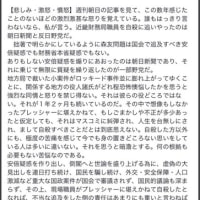
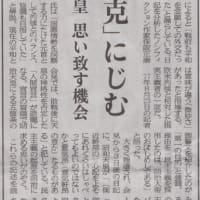
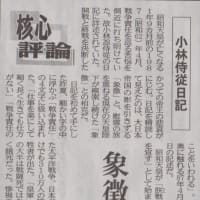
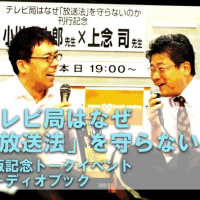
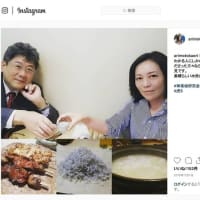
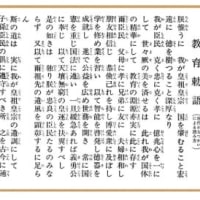


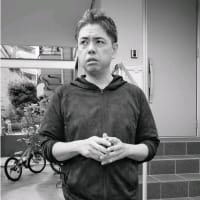
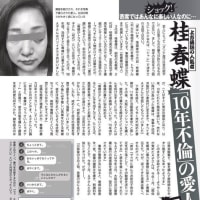
※コメント投稿者のブログIDはブログ作成者のみに通知されます